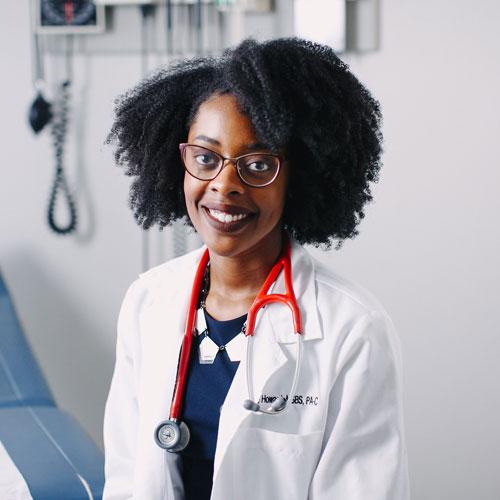
Many biology majors see a career path before them that includes microscopes, pipettes and research grants. Danielle Howard's path took a different turn, resulting in her rushing to the scene in an ambulance, assisting in joint replacements from foot to shoulder, checking kidney function and ventilators, and overseeing rounds for post-op cardiac patients in the intensive care unit.
While at Heidelberg, Howard, ’14, worked as a teaching assistant in the biology laboratory and earned her EMT certification partly by racking up on-the-job training hours in conjunction with her service learning for the Honors Program. She went on to complete the Physician Assistant program at the University of Toledo and now works as a PA at Richard M. Ross Heart Hospital within The Ohio State University Wexner Medical Center in Columbus as well as for an urgent care facility in the area.
Howard is not one to shy away from a busy schedule or hard work. While at Heidelberg, her full course load, three part-time jobs and active involvement in Kappa Psi Omega and the Greek Life Council helped her hone her multi-tasking skills for the life-saving work still to come. She especially credits the Honors Program for giving her experience in shaping her own future by way of choosing and designing coursework to best suit her interests, both personally and professionally.
“The Honors Program taught me how to assert my independence and how to approach academic success,” she said. “Like, ‘here’s what you need to do, now go fly.’”
According to Howard, she picked Heidelberg so she wouldn’t get tunnel vision with her degree. In her Physician Assistant program at UT, she was given strict coursework and timelines. But Heidelberg gave her the independence and space to think for herself and to acquire self-imposed time management skills.
These skills come in handy in her new position at OSU. Having been acting, literally, as the orthopedic surgeons’ right hand in the operating room in her previous post at Ohio Health – a few of Howard's duties included creating ACL grafts and closing after surgery – she realized she missed being involved more closely with the medical management side of care. That is why she went from interpreting the grunts and sighs of surgeons to anticipating their every need to now overseeing post-op care in the cardiac ICU. She assesses patients as a whole and has the authority to put in orders for their care and medicinal needs. She even is on-hand should there be any complications that would require the recovery bed to become a make-shift operating table involving cracking the chest back open to save a life.
In addition to working in the cadaver lab and as a teaching assistant at the Berg, Howard made sure to take quite a few religion courses. Why? She wanted to expand her worldview and acquire more patience and understanding in order to provide her patients with the most well-rounded care possible.
“People without this education may not ask certain questions. They just may not be aware,” Howard said. She cited as an example pre-emptive inquiries to female Muslim patients about their comfort level with a male doctor or if they would rather she treat them instead. Or, discussing alternative options to blood transfusions with Jehovah Witness patients ahead of time should the need arise during their procedure.
As Howard explained, if you do not ask these questions in advance, then you are left back-tracking — which is never ideal in sensitive situations such as surgery.
She also credits her liberal arts education for giving her a greater respect for outside expertise. Howard admits she can acknowledge what procedure or specialty may not be her forte, and she is not shy to ask for help from those better suited around her.
Outside of research work or pharmaceutical sales, some students may major in biology to give them a leg up for admission into a nursing or medical school. Howard is passionate about the fact that there are so many alternative pathways students can seek out.
In addition to the Athletic Training program at the Berg, Howard cites other physician assistants, anesthesiologists and surgeons, who also happen to be Student Prince alumni she has encountered as examples. By chance in conversation one day, Howard learned that one of the orthopedic surgeons she was working with at Ohio Health also hailed from HU. Dr. Nathaniel Long, ’94, mentioned Tiffin one day and a lasting connection was solidified.
“You find these alumni in pockets of the world you never knew existed,” she explained. She advises current and future student to utilize that network to both get experience (such as internships or part-time jobs) and to harness those connections when they are seeking permanent positions or graduate school entry.
“It’s all about connections.” And, at a small, close-knit school like Heidelberg, there are plenty of opportunities to forge those important bonds both with classmates who are destined for success and with graduates who are on the top of their game.